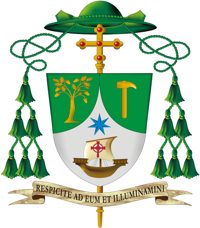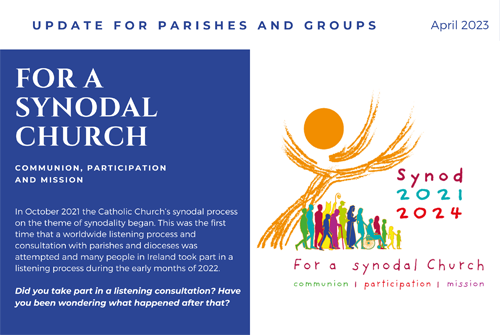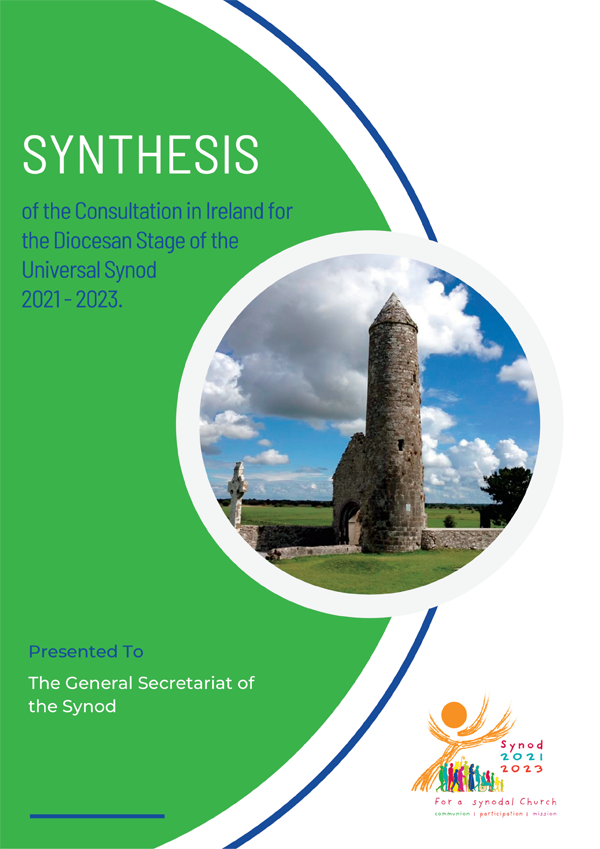October 2024

The final document of the XVI ORDINARY GENERAL ASSEMBLY OF THE SYNOD OF BISHOPS Second Session (2–27 October 2024) is now available – click below.
For a Synodal Church: Communion, Participation, Mission.
Submission of the Joint Synodal Committee of the Diocese of Galway, Kilmacdugah and Kilfenora, and the Diocese of Clonfert (April 2024)
The Synodal Pathway of the Catholic Church in Ireland has invited submissions from dioceses and groups that participated in the earlier stages of the process in advance of the second part of the universal assembly of the Synod on Synodality that will take place this October in Rome. The joint Synodal Committee the Diocese of Galway, Kilmacduagh and Kilfenora and the Diocese of Clonfert have made the following submission in answer to the two questions posed on co-responsibility.
"How can we imagine the life of the Church in Ireland where people are co-responsible for the Church’s mission in different ways?"
In a sense people in Ireland are currently grappling with a swinging pendulum when it comes to the idea of co-responsibility. For quite some time now the dominant operative model has been one where clerics were seen as the ones with sole responsibility for the life of the Church. In fact the Church in Ireland was often conceived solely as a clerical reality with the role of lay people envisaged as one of merely supporting or helping “Father”. Now newly-emphasised ideas such as synodality and co-responsibility tend to set the pendulum swinging in the opposite direction. We now speak of a Church where all the baptised seem to have come of age, where the baptised are now being recognised as constituting a Church where they are co-responsible for the mission. To some this might seem as a rather facile reaction to a situation where a decrease in clergy means that more lay involvement is necessary. To others it may be interpreted as ushering in a new age of the laity where perhaps priesthood may not be necessary. For some priests it may provide a framework to encourage greater lay participation. For others it may be seen as a confusion of identities and a real threat to the very idea of priesthood itself. As of yet the pendulum is still in a state of swing — it will take some time to steady and settle.
For the most part, like the idea of synodality, the concept of co-responsibility in the mission of the Church is new, or at least newly rediscovered. Given a distinct lacuna when it comes to adult faith formation, many do not have the theological background to grasp such ideas and the associated concepts that underpin them. Much informed explanation and discussion is needed, as is catechesis in the basic tenets of the Catholic faith. This context impeded in many ways a fulsome and fruitful discussion of the issue. Many are acutely aware of this and the need for urgent catechetical initiatives around the theological topics on which these concepts are build as well as on the concepts themselves.
While most would agree with the idea of co-responsibility — and laud it as an enlightened insight — many would speak of the difficulties of implementing it in practice. What would a truly co-responsible Church look like? What would a parish where co-responsibility was the norm feel like? How could it be imagined and how could it be modelled? What were its limits? In the end who is responsible for decision making and decision taking?
In an era of secularity and individualism where voluntary work and involvement is decreasing and proving challenging, how might this model play out? There was a recognition that the crisis of faith is fundamental to the context in which we find ourselves. Within a life of faith, the development and nurturing of the sense of vocation is also required. Who will do this, given the decrease in those practicing and the reduction in those willing to volunteer? Our present geographical parochial structure is challenged; parish life may need to be practiced across many parishes and parish communities.
The idea of being missionary in outlook, while acknowledged as necessary and urgent, continues to meet with a muted reaction – a history of keeping faith to oneself, along with a real sense of not knowing how to be missionary in a way that is not seen as overpowering others, needs to be teased out further. Some would wonder what type of Church we are inviting people to become part of — the idea of welcome, of being a welcoming Church was raised many times. However, what exactly that consists of remains rather illusive.
In the end, the current organs of shared responsibilities in parishes seemed to emerge as the best ones on which to hang some form of Synodality or co-responsibility — these being Parish Pastoral Councils and Parish Finance Committees. Recognising that these often lack a focus and direction, training and education in this regard was highlighted as both urgent and essential. The status of such bodies as regards decision making and real co-responsibility within our parishes was raised. This needs further discussion and appropriate determination at a worldwide level.
"Please provide a brief testimony of the work carried out and the experiences lived during the synodal process so far, sharing any good practice."
The current context is one where volunteers are few and far between and this is coupled with a history or culture of a lack of adult religious education/catechesis. The fact that this adult catechetical formation has been noticeably absent, along with increased demands from other areas of parish and diocesan life, are all very pressing issues. There can be no doubt that building an infrastructure that adequately supports synodal conversation will take time. It is felt that this process has made many additional demands on local and diocesan communities to produce something without giving them the necessary time and resources to grow key personnel, form them, and engage in the process in a fulsome manner. This results in ad hoc gatherings of people, often the same as have been at previous gatherings, rushed processes, and the production of reports for imposed deadlines, rather than an engagement in a real lived process. Against this backdrop, consultation for this submission took place through meetings with priests in one of the dioceses and through discussion with the inter-diocesan synodal committee and various interested parties.
Throughout both dioceses, the synodal committee, conscious of its limitations, is endeavouring as best it can to raise awareness of the idea of synodality and associated topics among clergy and laity. We have introduced some dedicated spaces to the topic on our websites and on our social media platforms. It has been discussed at gatherings of clergy in both dioceses and is a topic on the agenda of both Councils of Priests with the 'Conversations in the Spirit' methodology being introduced as appropriate to such gatherings. The methodology was also used at a recent gathering of the clergy from the Diocese of Galway, Kilmacduagh and Kilfnora. This gathering also included priests from the Diocese of Clonfert along with lay personnel from our two Diocesan offices. While it took some participants time to get used to the “Conversations in the Spirit” methodology, all found it an enriching experience and this bodes well for the future.
In line with the opinion that Parish Pastoral Councils and Parish Finance Committees provide a fertile ground for synodality in practice, across both dioceses new norms have been published for such bodies, new councils and committees have been formed, and we have embarked on a series of training sessions. These sessions address in particular the topics of Synodality, Contemporary Ecclesiological Perspectives, Co-responsibility and Missionary Discipleship. It was felt by all who are attending these sessions that a co-responsible Church will, in a very real sense, grow out of the renewal of the Pastoral Parish Councils and Parish Finance Committees. These bodies are certainly seen as agents of change within the parish, within the church, given the right formation and skills.
There is a general desire to be a more welcoming Church. However, a lack of human resources across the dioceses at the moment is hindering the work of reaching out to young people, those on the margins of Church and others, in order to find ways of creating more welcoming spaces within the tent. The ‘motto’ for our recent gathering in the Diocese of Galway, Kilmacduagh and Kilfenora mentioned above was “Together Towards Tomorrow” — keeping this in mind and in practice at all our gatherings is proving to be a worthwhile endeavour.
Stay up to date with Synodal progress
December 2023
The first phase of the Synodal Pathway of the Catholic Church in Ireland is now complete. This two-year phase, interwoven with the universal synodal process, concluded with two significant and complementary reports from the National Steering Committee. These two reports have now been published and are available online at www.synod.ie
The report prepared by the Steering Committee fulfils its remit to guide a two-year process of synodal listening and discernment for the Catholic Church in Ireland. It documents the learnings to date and offers recommendations to help shape and inform the next phase of this work.
A pilot training programme for local leaders is currently being developed and will be rolled out next year. Whilst the findings from the research report have shaped the modules/sessions for this training, they have also guided some of the recommendations in the Steering Committee's report.
Both reports include executive summaries for immediate digestion but do please take the time to read them in their entirety as they both inform the immediate and longer-term steps for the Irish Synodal Pathway.
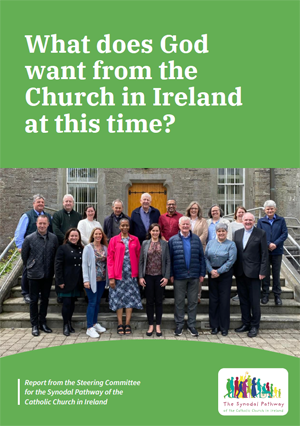
https://synod.ie/steering-committee-report/
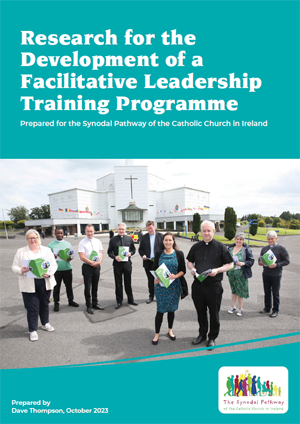
https://synod.ie/research-report-for-training/
Latest News – June 2023
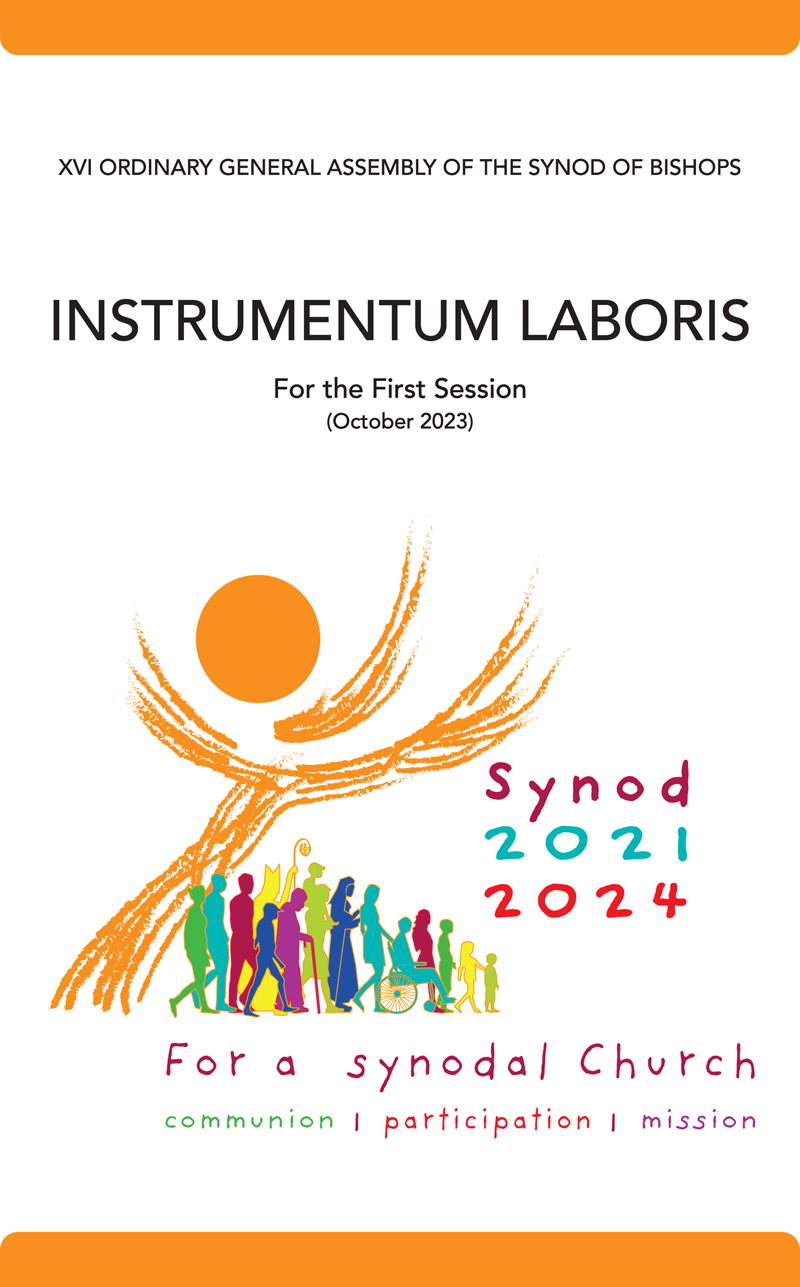 Instrumentum Laboris, the official working document for the first session of the 16th Ordinary General Assembly of the Synod of Bishops, was launched today, 20 June 2023. A large number of people from various parts of the world with different expertise prepared this important text, which will animate all the work of the October assembly. To access Instrumentum Laboris just click on the image or click here.
Instrumentum Laboris, the official working document for the first session of the 16th Ordinary General Assembly of the Synod of Bishops, was launched today, 20 June 2023. A large number of people from various parts of the world with different expertise prepared this important text, which will animate all the work of the October assembly. To access Instrumentum Laboris just click on the image or click here.
Video: Julieann Moran and Fr Eamonn Fitzgibbon had the responsibility at the Continental Synodal Assembly in Prague of relaying in six minutes some of the key insights that emerged in the synodal process in Ireland. We hear from them what were the issues that they focused on and what took away from the Assembly itself.
Video: Nicola Brady (Chair of the Steering Committee of the Irish Synodal Pathway) discusses the learnings from the recent Continental Assembly in Prague and how synodality has helped people engage with challenging issues in a constructive, prayerful and collective way.
Video: Rafael Luciani discusses how synodality has developed in Latin America since Vatican II, and some of the deeper roots of synodality in our Church's tradition. Rafael is a lay Venezuelan theologian who serves on the Theological Commission of the General Secretariat for the Synod of Bishops.
Video: Susan Pascoe shares her experience of synodality in helping to draft the Document for the Continental Stage in Frascati, and more recently attending the Continental Assembly in Suva, Fiji.
News and Resources from the Continental Assembly in Prague
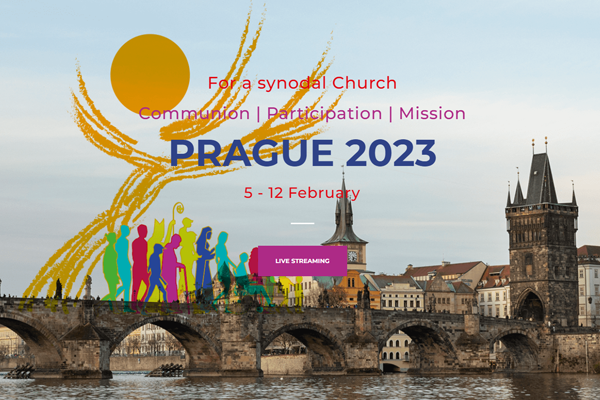 Much content can be found on synod.va/en and the website that was specifically created for the European Continental Assembly: prague.synod2023.org
Much content can be found on synod.va/en and the website that was specifically created for the European Continental Assembly: prague.synod2023.org
Professor Tomas Halik's Spiritual Introduction to the assembly can be downloaded here.
Each delegation was invited to prepare a meditative hymn or prayer as part of the assembly. The Irish delegates would like to thank Dr John O'Keeffe KSG for his composition of St Patrick's Breastplate, and Fr Bill Kemmy for the accompanying video.
Fr Eamonn Fitzgibbon and Julieann Moran addressed the assembly on Tuesday 7 February on behalf of the Irish delegation. They delivered the synthesised reflections from dioceses and organisations in Ireland on the questions from the Working Document for the Continental Stage.
All delegates were invited to make interventions during the plenary sessions of the assembly and Archbishop Eamon Martin, President of the Irish Episcopal Conference, offered a reflection on the relationship between synodality and the hierarchy on the Tuesday too.
Following the addresses from the 39 national delegations (both in-person and online) and all the interventions during the plenary sessions, the drafting committee presented the draft document from the European Continental Assembly on Thursday 9 February. In a 90-minute presentation, Fr Jan Nowotnik from the England and Wales delegation read the draft document in its entirety. This full reading can be found online on the CCEE's YouTube channel here (beginning at 33 mins). You can watch this brief interview with Fr Jan who found it a truly humbling experience to read the document that summed-up all the national syntheses and reflections, both the joys and the challenges, but also the great intention for us to become a synodal Church.
Nicola Brady, Chair of the Steering Comittee of the Irish Synodal Pathway, shared her initial reactions from the assembly with iCatholic. She highlighted how so much was learnt by the Irish delegation, especially the importance of the methodology for the spiritual conversations in the process, but that there is also so much more still to do. Archbishop Eamon also shared how something special had happened at the assembly with the diversity of those gathered, but with everyone listening to the voice of the Holy Spirit as the one Body of Christ.
On Friday 10 February and Saturday 11 February, the presidents of the Bishops' Conferences of Europe continued to meet to collegially consider the lived synodal experience from their specific charism and role as bishops. They undertook to develop further “a synodal Church” following the indications of Pope Francis, rejoicing in how the works of the Continental Assembly in Prague were “an unmistakable sign of our unique belonging to Christ.” Their final remarks can be read here.
Continental Stage of Universal Synod 2021–2024 :: Irish Synodal Pathway
Diocese of Galway, Kilmacduagh and Kilfenora :: Diocese of Clonfert
This Submission was prepared by a joint group of participants from the two dioceses in response to the Diocesan, National and Continental Syntheses
Read below or click here for a pdf.
6 January 2023
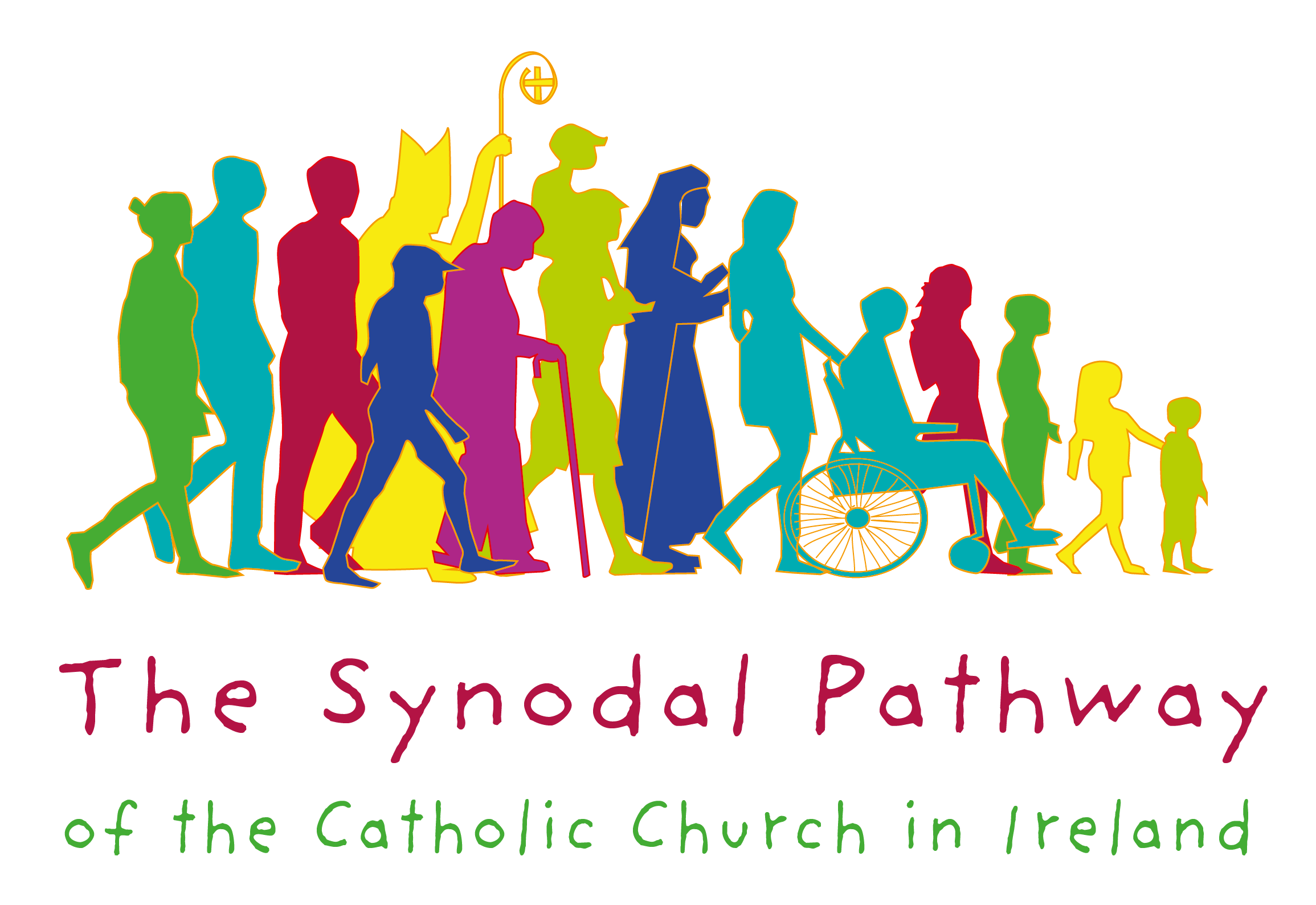
EXPERIENCES OF THE CHURCHES
There is an awareness that God IS preparing something new and we are called to participate in this plan. The synodal process itself is seen as a means of opening horizons of hope for the fulfilment of the Church’s mission and certainly “listening to the faithful” has strengthened the feeling of belonging to the Church.It is clear, that while there are similarities in themes across all documents, there are also very different priorities on the five continents. Issues that are strong in Western countries, e.g. LGBTQIA+ and the role of women, may not find such a strong echo in the African church. However, there was a great feeling of belonging to the Church, in spite of the tensions, along with the realisation, on a practical level, that the Church is not just priests and bishops.
The DCS points out the standout themes that appear again and again in the Church — inclusivity, co-responsibility, accountability, the roles of women, the shortage (at least in the Western Church) of vocations to the priesthood and religious life, transparency, etc. As we journey we must name the “lights and the shadows” of our Church’s life.
There is a clear desire across the continents to “enlarge the tent” and move forward in mission; a desire to be more inclusive and to welcome diversity. But we need to watch our language. The DCS itself appears to be aimed at clergy or people with a theological background. It is difficult to understand in parts.
Ultimately, the overall experiences of the Churches are that we are learning to walk together, sitting together to break the one bread. Again and again we are reminded that no one is to be excluded. This is coupled with an experience of a less than satisfactory participation/input from priests and bishops in the process and the meagre presence of the voice of young people.
The final goal is high — “a Church that boldly proclaims its authentic teaching while at the same time offering a witness of radical inclusion and acceptance through its pastoral and discerning accompaniment. And while the Eucharist continues to be the “source and summit” of a synodal Church, synodal listening itself brings up many issues from rethinking a liturgy too concentrated on the celebrant, to the active participation of the laity and access of women to ministerial roles.
CHALLENGES TO ADDRESS
The challenge facing us is the creation of a world-wide Church that truly is “stretching out”, “making room for diversity without losing its spirituality and core historical value”. Almost all reports highlight the issue of “full and equal participation of women”, but there is no agreement on a single or complete response to bring about such full and equal participation. A key challenge will be enabling women to participate more fully at all levels of Church life everywhere.
There is very little mention of youth/adult ongoing faith formation in the DCS. There is an urgent need to renew the focus on our youth, while at the same time continuing to nurture those adults committed to their faith journey. “We are a learning Church, and to be so we need continuous discernment to help us read the Word of God and the signs of the times together, so as to move forward in the direction the Spirit is pointing us”. Biblical and faith formation is going to be a huge challenge.
Regarding ongoing faith formation, the Church has to be aware of not watering down the core message of our Christian beliefs to a lowest common denominator. The synodal process has given the Church a new energy and so expectations of rapid change are high. “For many, radical inclusion means radical change” and the challenge will be to see all within the context of the call to personal conversion and reform of the Church, while maintaining its mission based on the person and teachings of Jesus Christ.
The clerical abuse in the Church has turned many people away and this is a huge challenge for the future. While much has been done in this area, so much more remains to be done.
Ridding the Church of clericalism has to be a priority if synodality is to take hold. The DCS stresses the role of all the faithful, by merit of their Baptism, in a synodal Church — ALL can help to fulfil the Church’s mission. The involvement of the entire People of God becomes a challenge and a priority as the Church faces an aging clergy and a dramatic reduction in vocations to the priesthood and the religious life. “The laity are capable, talented and willing to contribute more and more, provided they are given opportunities” — therein lies the big challenge, coupled with the wish that no one should be excluded.
PRIORITIES AND CALLS TO ACTION (LOCAL DIOCESE/COMMUNITY)
People are moving away from Church, Mass, Sacraments etc., with the claim of being ‘spiritual’ but not ‘religious’.
Reassure those concerned about Synodality that the Church’s fundamental teachings will not change, nor how decisions are made within the Church. Local churches should speak about the Synodal process, awakening people to the renewal that is taking place. Most are unaware of the process.
Celebration of Sacraments of Initiation alone has not led to a daily life of faith. There is an urgent need for ongoing faith formation at all levels — youth and adult — which is proactive and where no one is excluded. This formation must be given the same priority and resources as the provision of the Sacraments themselves.
Arising from this synodal listening process is the desire and appetite for enriching our lives with the Word of God.
We must become conscious of the role of the laity, and in particular, women, in the Church we dream of. The desire is there for a genuine reform and renewal of our Church and we are aware of the importance our faith witness is going to have in the consumerist society in which we live.
The sense of belonging has to be more than pious platitudes. We need a Church that is reflective of inclusiveness, recognising the inconsistency in the Church’s message and what is perceived to be Christ’s inclusive message, e.g., the makeup of families today, the LGBTQIA+ community, family planning and the Church’s response to poverty and climate change.
PRIORITIES AND CALLS TO ACTION (The Catholic Church in Ireland)
Structures and processes for synodality are not in place; while structures in themselves are not enough, there is a need for ongoing formation to support a synodal culture.
The synodal process is broad and progress is likely to be slow. In the meantime the Church must continue to work on local issues; co-responsibility, lay participation, adult faith formation etc. The People of God struggle to believe, against and within an ever more secular background.The Church needs to encourage clergy and religious to really commit to the Synodal process. It seems there has been a lack of interest on the part of many clergy and bishops to the process.
Clerical abuse in the Church has turned many people away — this still needs to be dealt with. We must not be afraid of the sins and shadows of the past. Those abused by the Church must be listened to and hurts must be healed.
Dreaming of a Church where everyone IS welcome, we have to be aware of the LGBTQIA+ community, those separated/divorced, divorced and remarried, those with disabilities, travellers, migrants, the elderly, those disillusioned or disenfranchised from the Church for whatever reason. There must be a genuine focus on our youth.
The role of women within the church and their exclusion from many roles, along with a broader understanding and support of different family types.
Care and support for our aging priests/religious, coupled with a new model of parish where everyone is using the gifts given them by God.
PRIORITIES AND CALLS TO ACTION (The Universal Church)
There needs to be a renewed and genuine focus on our youth, alongside a focus on a reinvigorated adult ongoing faith formation programme. The process of discernment must continue; we must be mindful that while participation was widespread across continents, only a relatively small number of practising Catholics participated in the initial stage of the synodal process, and an even smaller number of youth!
The Church must continue its momentum towards becoming a Missionary Synodal Church. The need to provide formation in synodality must be a priority.
The need for life-long biblical/faith/religious formation is another priority. The People of God need this education if they are to grow in an awareness of who they are and what God expects of them. This formation must also include examples of how we integrate faith and culture.
Again and again we hear the call for women to be given equal treatment in leadership and decision making. The Church has to respond to these calls and the response must be visible.
There has to be greater compassion and awareness of what comprises a ‘family’ today, sexual identity, human population growth, global warming and the ensuing crises. We live in a rapidly changing society of which we are a part; it is in this society that we are called upon to be disciples. An urgent call for better care of the earth locally, nationally and globally needs to be voiced. It has been hardly mentioned at all, though very close to Pope Francis’ heart.
The Continental Stage of the Universal Synod
We are now in the next stage of the Universal Synod, which is the Continental Stage. The Synod office in Rome recently published a working document called Enlarge the Space of Your Tent (Isaiah 54:2) which can be downloaded here, or found on the Irish Synodal website: synod.ie/working-document-for-the-continental-stage-of-the-synod.
It is a truly remarkable document as it offers us a glimpse into the sense of the global faithful at the beginning of this third millennium and also offers us a chance to see how diverse we are as Catholics around the world.
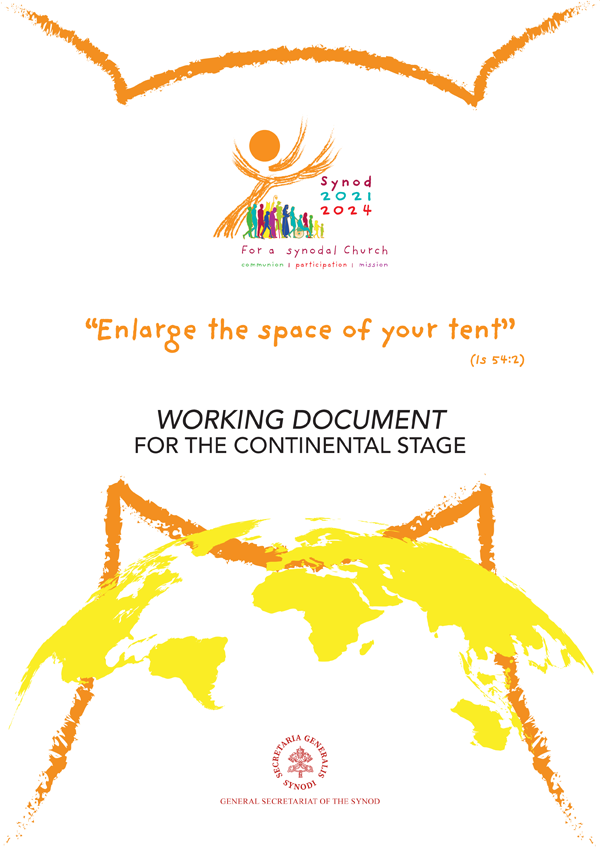
Synthesis of the consultation in Ireland for the diocesan stage of the Universal Synod 2021–2023
— National synthesis of synodal process published during Mass celebrated by Bishop Michael Router at Knock Novena —
Download the full document here.
“Important questions have been set out for deeper reflection and pastoral action at every level of Church life, and there will be many more opportunities for people to get involved and help shape this process”
– Dr Nicola Brady
A significant milestone in the synodal process currently underway in the Catholic Church in Ireland is the publication of the national synthesis of local listening that took place in dioceses and other contexts between October 2021 and May 2022. This national synthesis has now been submitted to the Synod Secretariat in the Vatican as part of the global synodal process announced by Pope Francis for the Church, running from 2021 to 2023 with the theme ‘For a Synodal Church – Communion, Participation, Mission’. The national synthesis will be published on www.synod.ie.
The completion of this important phase in both the national and universal synod process was marked with Mass as part of the annual Novena in Knock Shrine, which this year took the theme ‘A Journey of Hope’. The Mass was celebrated by Bishop Michael Router, Auxiliary Bishop of Armagh and a member of the Synod Steering Committee. Committee Chair Dr Nicola Brady gave an address reflecting on the synodal experience in Ireland to date.
Reflecting on the process to date, Bishop Router said: “As we publish the synthesis of the consultation in Ireland for the Universal Synod, I wish to express my thanks to the thousands of people nationwide who took the time to respond and to make their voice heard. In reading the varied responses gathered in the Archdiocese of Armagh, and the completed national synthesis, I was struck by the pervasive desire to feel a deeper sense of belonging to the Church and the call for it to be more inclusive. I pray that this relaunching of the synodal way will help people to realise that we are all part of a community of sinners walking together on the road, supporting and helping each other as we strive to live as Jesus Christ wants us to. May everyone appreciate that they are loved by God, and regardless of their circumstances, find a welcome in his Church.”
Inviting people to read the national synthesis, Nicola Brady said: “We invite everyone to read the national synthesis and reflect on what we are called to do, as individuals and as a church community, as a result of what we have heard. The issues raised are not new, but the honesty and clarity with which they have been articulated in this process, and the relational approach that has characterised the work to date, offers a strong foundation to build upon. Some of the findings are stark, many of the experiences shared are painful, but there have also been many hopeful and encouraging aspects, notably the importance many people have placed on this process and the skills and experience we will take forward into the subsequent phases of this work. Important questions have been set out for deeper reflection and pastoral action at every level of Church life and there will be many more opportunities for people to get involved and help shape this process.”
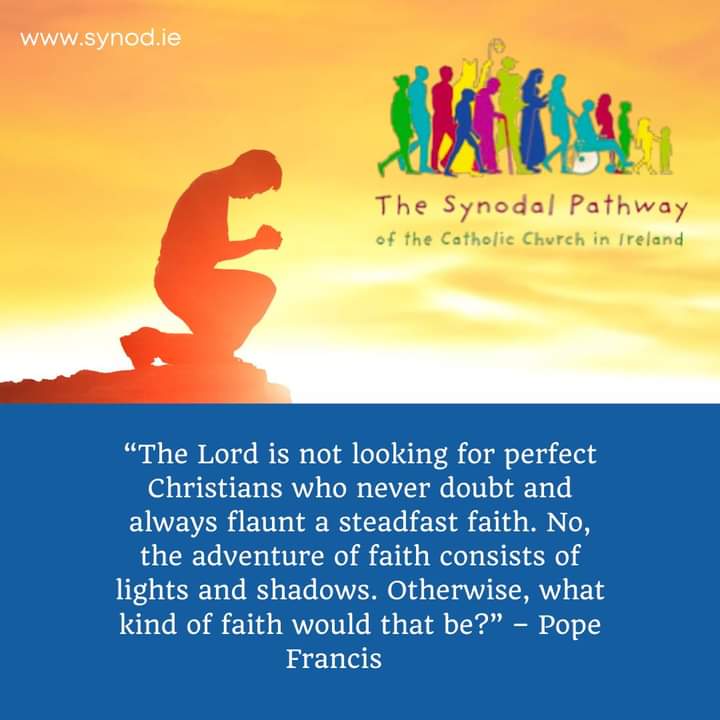 Synod is a Greek word (synodos) meaning a meeting or assembly. By convening the Universal Synod, Pope Francis invites the entire Church to reflect on a theme that is decisive for its life and mission.
Synod is a Greek word (synodos) meaning a meeting or assembly. By convening the Universal Synod, Pope Francis invites the entire Church to reflect on a theme that is decisive for its life and mission.
In recent months the Galway Diocesan Synodal Team has reached out to parishes and to people within and without the faithful community, to listen and hear what they had to say.
The results of this listening is available now in the 10-page diocesan document below, along with the separate appendices information.
Click here for the Diocesan Synthesis
Click here for the Appendices
‘‘No-one can be excluded.’’ — Pope Francis
Pope Francis is asking the Church to listen to every voice in the community – laity, disenfranchised, religious – each and all who have a view to offer.
We aspire "to plant dreams ... allow hope to flourish, inspire trust, bind up wounds, weave together relationships, awaken a dawn of hope, learn from one another, and create a bright resourcefulness that will enlighten minds [and] warm hearts..." (Pope Francis, address of 3 October 2018).
The synodal mission:
— Humility in listening;
— Courage in speaking;
— An invitation to dialogue.
We come together to listen to each other, and enter into dialogue in order that we will change.
For further information on the synodal process, see synod.ie

